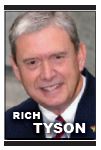By Richard Tyson
Have you found yourself feeling powerless lately? If so, you are in good company. The extraordinary challenges of 2020 have combined to discourage even the most ardent optimist. One of the most serious casualties of the current turmoil today is our confidence that we can solve the problems we face.
The decline of confidence has become a pandemic in and of itself, affecting leaders and their constituencies in both business and society at large. There is a real danger that this will have more long-term and insidious effects than the coronavirus.
Three concerns emerge for me:
1. A strong and growing undercurrent of victimization; that is, that virtually all of us begin to see ourselves as victims. While it is clear that many have been victims of COVID-19, crime, racism or natural disasters, the danger here is that we begin to generally define ourselves as victims instead of as confident human beings who are capable of solving problems.
2. Victimhood, then, has a tendency to lead to a sense of entitlement — that we are entitled to having someone solve the problem that has victimized us. In terms of the old maxim, we want to be fed a fish, not learn how to catch the fish. Entitlement robs us of our adulthood, returning us to being dependent on others who metaphorically stand in as our caretakers.
During the pandemic, governmental entitlement has grown to its highest level in history. Most Americans have come to expect that the government will keep us alive. While we have reason to be grateful for governmental intervention in our economy, we should recognize that we cannot look to it to always bail us out. Entitlement is a counterfeit insurance policy, one that should never replace self-reliance and hard work.
3. By handing off our problems to others, we surrender our right, responsibility and accountability for solving them. This may sound somewhat attractive, but in the end, it is a “worst case scenario.” By our lack of participation in defining and solving our problems, our buy-in and support for solutions is inevitably quite shallow. We feel little responsibility for helping make things work, and when they don’t (as often is the case), we revert back to being a victim. We castigate those who offered the flawed solution — and cry out for the better solutions to which we feel entitled.
These societal trends have huge implications for today’s business leaders. Where we inherently strive to build teams of highly competent and engaged people, the tendency for employees to see themselves as victims leads away from these outcomes. Individual efforts to become highly competent diminish as people see themselves as victims. They tend to increasingly blame others for their challenges and expect others to solve them. Competency is replaced by complacency and dissatisfaction, which in turn leads to disengagement.
Victimhood and entitlement, then, are ultimately the sources of not only feeling powerless, but actually being powerless!
So, what can we as business leaders do to stem the tide of victimization and entitlement? Perhaps the words of Pres. John F. Kennedy in his 1961 inaugural address will help guide us, and our constituencies, to a more powerful mindset. He concluded his speech with these words:
“And so, my fellow Americans, ask not what your country can do for you — ask what you can do for your country.”
Kennedy’s words dispelled the notion of victimhood or entitlement. They suggest that there were problems to be solved and work to be done, and that work was not the province of government alone but was the responsibility of every woman and man.
So, the question before us today, in our businesses and society in general, should not be “Who is to blame for our problems?” Blaming only contributes to our sense of being victimized. Nor should it be “Who will bail me out?” This question empowers others but leaves us impotent to solve our own problems.
The question should be “Who is responsible for solving the problem?” And, although it is wise to engage others in problem-solving, the answer to this question inevitably includes each of us.
As leaders, we need to be vigilant in assessing the mindset of our people, balancing empathy for their concerns with the clear assertion that they are capable of addressing the problems that face them, at work and in our society. It is this powerful mindset of a successful future that will see us through these turbulent times.
Richard Tyson is the founder, principal owner and president of CEObuilder, which provides forums for consulting and coaching to executives in small businesses.








